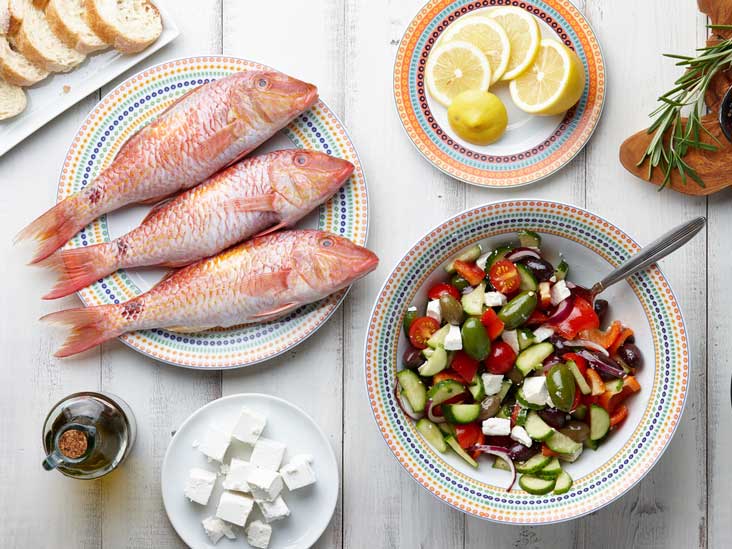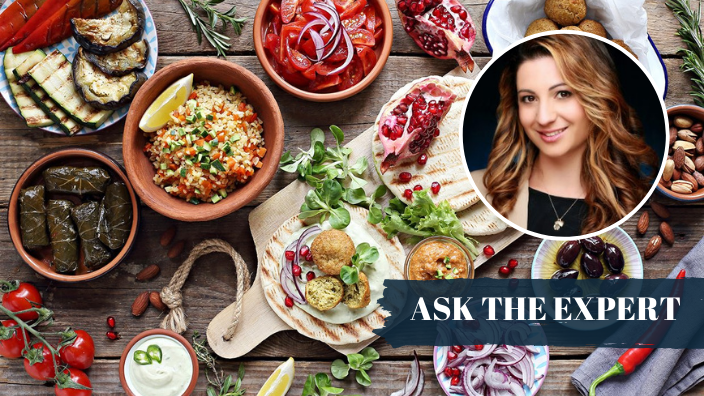By Georgia Pandelios, Accredited Practising Dietitian and Owner at Nutrition Prescription.
We often recommend the traditional Mediterranean diet for various medical issues such as type 2 diabetes, infertility, heart disease, inflammatory diseases, depression and general healthy eating for the prevention of diseases like dementia or bowel cancer – because of how wonderfully nutritious it is.
It is rich in antioxidants, which work to reduce inflammation in the body, has a good balance of healthy fats – making it great for improving cholesterol levels and overall heart health, and it is especially rich in fibre which has been shown to help us mentally through the gut-brain axis, whilst also helping to make us feel fuller from meals.
Whilst us Greeks take pride in the Greek roots of the Mediterranean dietary pattern, this diet really encompasses the eating patterns of people bordering the Mediterranean Sea, which also includes Spain, Italy, Morocco, even Libya. Although our languages and cultures differ, our dinner tables have many, many similarities. It is a diet rich in grains, fruits, vegetables, seafood, extra virgin olive oil, and flavour.
READ MORE: Fat facts: Cholesterol friendly diet explained by dietitian, Georgia Pandelios

READ MORE: Can a healthy diet boost your immune system? Dietitian Georgia Pandelios dishes up
It is the latter that makes it so sustainable, because to be frank, if a diet is unappealing or too hard to follow – you won’t stick to it, at least not for long – regardless of your reasons for starting it.
What foods to include in the Mediterranean diet:
- Plenty of fruits and vegetables. Let the vegetables star in your dishes, with meats taking a back seat. The perfect example are kolokithokeftedes (zucchini fritters). Others include yemista or dolmades – you can have these with mince or orfana (without meat).
- Extra virgin olive oil. On everything.
- Legumes and pulses. I love revithokeftedes (chickpea patties), I make a large batch and freeze half so I save time in food-prep later in the week.
- Fish and seafood. Try a variety of seafood, like baked calamari stuffed with rice, fish soup or saganaki prawns.
- Breads or cereals that are wholegrain.
- Nuts and seeds. A great source of healthy fats and fibre – be mindful of portions if trying to lose weight.
- Eggs, dairy, and lean meats. These include chicken, turkey and offal.
- Small amounts of red meats and wine.
- Flavour – onions, garlic, herbs and spices elevate a simple dish into a mouth-watering edible piece of art. For example, tiropsomo, a bread baked with feta cheese. Without the mint and dill, it would simply be cheese bread but with these herbs, it has a complex palate that stimulates your taste buds and smell receptors at the same time – making it that much more enjoyable.
- Plenty of fruits and vegetables. Let the vegetables star in your dishes, with meats taking a back seat. The perfect example are kolokithokeftedes (zucchini fritters). Others include yemista or dolmades – you can have these with mince or orfana (without meat).
- Extra virgin olive oil. On everything.
- Legumes and pulses. I love revithokeftedes (chickpea patties), I make a large batch and freeze half so I save time in food-prep later in the week.
- Fish and seafood. Try a variety of seafood, like baked calamari stuffed with rice, fish soup or saganaki prawns.
- Breads or cereals that are wholegrain.
- Nuts and seeds. A great source of healthy fats and fibre – be mindful of portions if trying to lose weight.
- Eggs, dairy, and lean meats. These include chicken, turkey and offal.
- Small amounts of red meats and wine.
- Flavour – onions, garlic, herbs and spices elevate a simple dish into a mouth-watering edible piece of art. For example, tiropsomo, a bread baked with feta cheese. Without the mint and dill, it would simply be cheese bread but with these herbs, it has a complex palate that stimulates your taste buds and smell receptors at the same time – making it that much more enjoyable.
READ MORE: Dietitian, Georgia Pandelios, shares her top tips on meal planning like a pro

READ MORE: Dietitian, Georgia Pandelios, shares her top eight tips for shedding those COVID curves
It’s about more than just the food:
The Mediterranean diet includes a assortment of eating behaviours or habits – not just recipes. Some of these eating behaviours involve how often we eat things like meats and sweets, sharing meals with others, eating at the table, and eating slowly – to enjoy the meal and the company.
Although not always practical, gathering or ‘foraging’ for our foods is another component. For many of us this includes learning to fish from a young age, tending to a family vegetable garden, picking fruit from Pappou’s orange tree, even picking and cleaning beans with Yiayia and her sharp little knife (yes, the one she uses to pick leafy greens with).
In my opinion, this way of eating is far superior than any other diet. It meets our needs nutritionally in a healthful and practical sense. A bigger discussion for another day, is how sustainable it is for our environment too. Following the Mediterranean-style diet teaches us how to take eating and make it a positive experience for the whole family.

READ MORE: How to be vigilant when babysitting grandkids with food allergies
If you need help aligning your diet with the Mediterranean dietary pattern, contact Nutrition Prescription for a nutrition assessment with tailored nutrition recommendations. You can book through www.nutritionprescription.com.au or email info@nutritionprescription.com.au.
Nutrition Prescription accredited practising dietitians offer nutrition consultations that are specially designed for the whole family – from infants to adults and elderly, through to highly specialised fertility-preconception, paediatric, sports nutrition and food reaction services. We can assist with all your nutrition needs, including complex and chronic conditions – in English, Greek and Portuguese.
Follow Nutrition Prescription on Instagram & Facebook
Disclaimer: The information in this article is generalised and is not intended to replace medical or dietetic advice, nor directly manage any medical conditions. For personalised advice, please speak with your doctor or contact us via info@nutritionprescription.com.au to make an appointment with one of our Dietitians.

